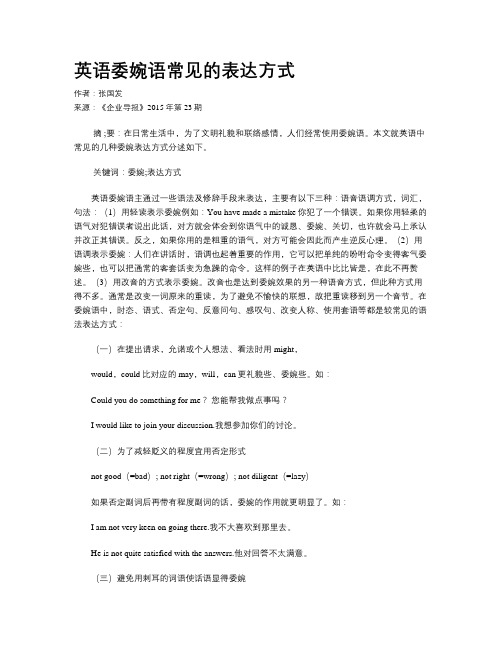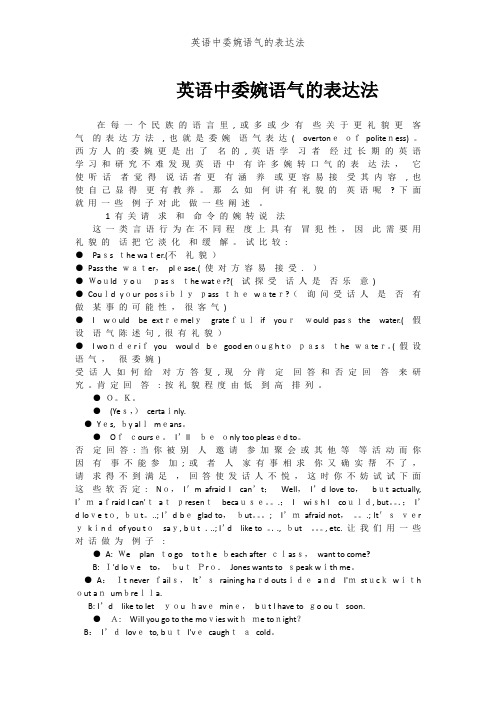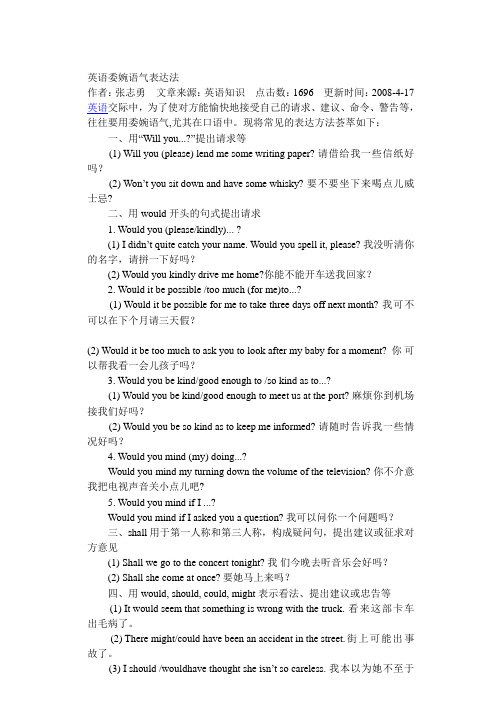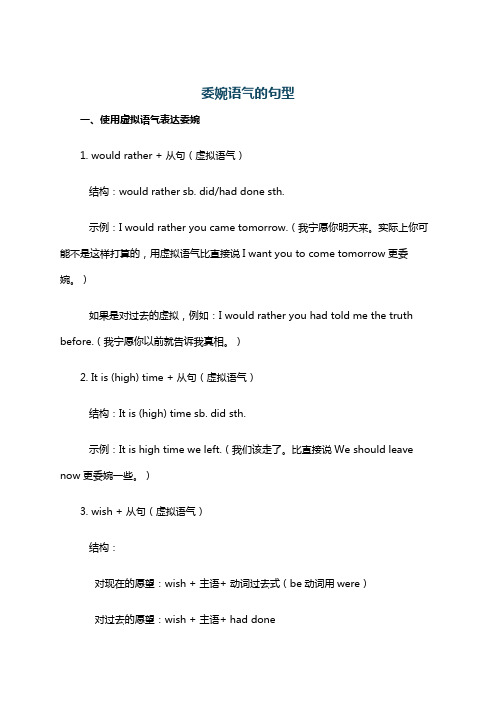英语委婉语气表达法资料讲解
英语委婉语常见的表达方式

英语委婉语常见的表达方式作者:张国发来源:《企业导报》2015年第23期摘 ;要:在日常生活中,为了文明礼貌和联络感情,人们经常使用委婉语。
本文就英语中常见的几种委婉表达方式分述如下。
关键词:委婉;表达方式英语委婉语主通过一些语法及修辞手段来表达,主要有以下三种:语音语调方式,词汇,句法:(1)用轻读表示委婉例如:You have made a mistake你犯了一个错误。
如果你用轻柔的语气对犯错误者说出此话,对方就会体会到你语气中的诚恳、委婉、关切,也许就会马上承认并改正其错误。
反之,如果你用的是粗重的语气,对方可能会因此而产生逆反心理。
(2)用语调表示委婉:人们在讲话时,语调也起着重要的作用,它可以把单纯的吩咐命令变得客气委婉些,也可以把通常的客套话变为急躁的命令。
这样的例子在英语中比比皆是,在此不再赘述。
(3)用改音的方式表示委婉。
改音也是达到委婉效果的另一种语音方式,但此种方式用得不多。
通常是改变一词原来的重读,为了避免不愉快的联想,故把重读移到另一个音节。
在委婉语中,时态、语式、否定句、反意问句、感叹句、改变人称、使用套语等都是较常见的语法表达方式:(一)在提出请求,允诺或个人想法、看法时用might,would,could比对应的may,will,can更礼貌些、委婉些。
如:Could you do something for me?您能帮我做点事吗?I would like to join your discussion.我想参加你们的讨论。
(二)为了减轻贬义的程度宜用否定形式not good(=bad); not right(=wrong); not diligent(=lazy)如果否定副词后再带有程度副词的话,委婉的作用就更明显了。
如:I am not very keen on going there.我不大喜欢到那里去。
He is not quite satisfied with the answers.他对回答不太满意。
表现委婉的语气的各类时态及用法

表示委婉的语气的各种时态及用法用直陈式未完成过去时表示委婉的请求或愿望不适用于所有的词,仅限于vouloir、venir、用来替代现在时,Je voulais vous demander votre permission.Je venais te passer un petit coucou.表示委婉的建议常与Si并用Si on allait au cinéma ?表示委婉的责备则用于表示过去应做而没做falloir :Il fallait nous laisser un message mais personne ne nous a informés. devoir:Tu devais me dire la véritémais tu m’as menti.pouvoir:Elle pouvais nous dire son adresse.用直陈式愈过去时表示委婉的请求,用法同未完成过去时但更委婉J’étais venue juste pour vous demander si vous pouviez m’aider.用条件式现在时表示现在委婉的请求适用于vouloir,aimer,pouvoir,Je voudrais/aimerais bien un caféSVPPourriez-vous me passer le sel ?J’aimerais avoir votre adresse SVP.表示现在委婉的建议,用于devoir,falloir,faire mieux,valoir mieux 加不定式,其中v aloir mieux 还可加que +虚拟式Tu devrais travailler dur pour réussir.用条件式过去时表示请求(跟前几个用法比较主要是可能跟过去有关系)或遗憾,适用于vou loir,aimerJ’aurais aimé/voulu avoir un RDV à7h et demie, c’est possible ?表示委婉的责备表示过去应做而没做用于pouvoir和devoir+不定式,valoir mieux+不定式/que + 虚拟式Tu aurais pu me prévenir plus tôt et mtn, c’est trop tard !Il aurait dûl’accompagner le soir, mais il n’a pas fait.Il aurait mieux valu que vous disiez la véritétout de suite.SVP s'il vous plaît。
英语中委婉语气的表达法

英语中委婉语气的表达法在每一个民族的语言里, 或多或少有些关于更礼貌更客气的表达方法, 也就是委婉语气表达(overtoneofpoliteness) 。
西方人的委婉更是出了名的, 英语学习者经过长期的英语学习和研究不难发现英语中有许多婉转口气的表达法,它使听话者觉得说话者更有涵养或更容易接受其内容, 也使自己显得更有教养。
那么如何讲有礼貌的英语呢? 下面就用一些例子对此做一些阐述。
1 有关请求和命令的婉转说法这一类言语行为在不同程度上具有冒犯性,因此需要用礼貌的话把它淡化和缓解。
试比较:●Pass the water.(不礼貌)●Pass the water,please.( 使对方容易接受.)●Would youpassthe water?(试探受话人是否乐意)●Could your possiblypass thewater?(询问受话人是否有做某事的可能性,很客气)●I would be extremelygratefulif yourwould passthe water.(假设语气陈述句, 很有礼貌)●I wonder ifyou wouldbegood enough topassthe water。
( 假设语气,很委婉)受话人如何给对方答复, 现分肯定回答和否定回答来研究。
肯定回答: 按礼貌程度由低到高排列。
●O。
K。
●(Yes,)certainly.●Yes, by allmeans。
●Ofcourse。
I’llbeonly too pleased to。
否定回答: 当你被别人邀请参加聚会或其他等等活动而你因有事不能参加; 或者人家有事相求你又确实帮不了,请求得不到满足,回答使发话人不悦,这时你不妨试试下面这些软否定:No,I'm afraid I can’t;Well,I’d love to,but actually, I’mafraid I can'tatpresentbecause。
英语中委婉语气的表达法(记录图表)

英语中委婉语气的表达法在每一个民族的语言里,或多或少有些关于更礼貌更客气的表达方法,也就是委婉语气表达(overtone of politeness)。
西方人的委婉更是出了名的,英语学习者经过长期的英语学习和研究不难发现英语中有许多婉转口气的表达法,它使听话者觉得说话者更有涵养或更容易接受其内容,也使自己显得更有教养。
那么如何讲有礼貌的英语呢?下面就用一些例子对此做一些阐述。
1 有关请求和命令的婉转说法这一类言语行为在不同程度上具有冒犯性,因此需要用礼貌的话把它淡化和缓解。
试比较:●Pass the water.(不礼貌)●Pass the water, please.(使对方容易接受。
)●Would you pass the water?(试探受话人是否乐意)●Could your possibly pass the water?(询问受话人是否有做某事的可能性,很客气)●I would be extremely grateful if your would pass the water.(假设语气陈述句,很有礼貌)●I wonder if you would be good enough to pass the water.(假设语气,很委婉)受话人如何给对方答复,现分肯定回答和否定回答来研究。
肯定回答:按礼貌程度由低到高排列。
●O.K.●(Yes,) certainly.●Yes, by all means.●Of course. I'll be only too pleased to.否定回答:当你被别人邀请参加聚会或其他等等活动而你因有事不能参加;或者人家有事相求你又确实帮不了,请求得不到满足,回答使发话人不悦,这时你不妨试试下面这些软否定:No, I'm afraid I can't; Well, I'd love to, but actually, I'm afraid I can't at present because...; I wish I could, but...; I'd love to, but...; I'd be glad to, but...; I'm afraid not, ...; It's very kind of you to say, but ...; I'd like to ..., but ...,etc. 让我们用一些对话做为例子:●A: We plan to go to the beach after class, want to come?B: I'd love to, but Pro. Jones wants to speak with me.●A: It never fails, It's raining hard outside and I'm stuck without an umbrella.B: I'd like to let you have mine, but I have to go out soon.●A: Will you go to the movies with me tonight?B: I'd love to, but I've caught a cold.●A: Could you possibly do me a favor?B: Sure, What is it?A: I've got a problem. I have to fix my table and I don't have a hammer. Could I possiblyborrow yours?B: I'm sorry. I'm afraid I don't have one.A: Oh .Do you know anybody who does?B: Yes. You should call Charlie. I'm sure he'll be happy to lend you his.A: Thank you. I'll call him right away.●A: It's such a fine day, shall we go to the park for a walk?B: I'd like to join you, but I find it chilly to walk outside in spite of the sun.2 劝告的婉转法试比较下面句子(按从直截了当到较有礼貌的含蓄的劝告表达法排列)●You ought to type this paper.(有强加于人的意向)●You really should slow down at your office.●You'd better tell him the truth.●I'd advise you to take a vacation.●You should take your parents' advice, they know what's best for you.●If I were you , I'd buy another car without hesitation.(含蓄地达到劝告目的)3 建议的表达法试比较:●I suggest you go for some advice.(不够礼貌,用于熟悉的人)●I would suggest starting the work at once.(较委婉)●You can read the novel now if you like.(给人选择余地,较客气)●You could/might have a look at the novel.(客气)●Why not call me next weekend?(有礼貌的建议)●Why don't you find a decent job?(同5))●Can /may/Could/might I suggest that...?(使受话人容易接受)●It would be better if you copy that again.(假设条件句,容易使人接受)●I wonder if I might make the suggestion that...(用在正式场合,比如外交家的审慎的辞令风格)4 如何利用某些时态婉转地表达自己种种想法从上面所举例子,我们不难发现英语中有些时态其实并不表示真正的时态,而是与英语中的委婉语气密不可分的,例如:4.1 某些实意动词(want, wonder, think, hope等)的过去时、现在进行时、过去进行时表现在时比直接用现在时态更婉转,如:●A: Did you want me?B: Yes, I wondered if you could give me some help.●It's time you had a holiday.●I wish you lived closer to us.●If only you lent your book to me.●I'm hoping you'll give us some advice.●I'm wondering if I may have a word with you.●I was wondering /wondered if you'd like to come out with me one evening.●I was hoping / hoped you could send me some books.上面所举例子实际上都可以用一般现在时来代替,但是就不如用一般过去时;现在进行时或过去进行时委婉。
英语委婉语气表达法

英语委婉语气表达法作者:张志勇文章来源:英语知识点击数:1696 更新时间:2008-4-17 英语交际中,为了使对方能愉快地接受自己的请求、建议、命令、警告等,往往要用委婉语气,尤其在口语中。
现将常见的表达方法荟萃如下:一、用“Will you...?”提出请求等(1) Will you (please) lend me some writing paper? 请借给我一些信纸好吗?(2) Won’t you sit down and have some whisky? 要不要坐下来喝点儿威士忌?二、用would开头的句式提出请求1. Would you (please/kindly)... ?(1) I didn’t quite catch your name. Would you spell it, please? 我没听清你的名字,请拼一下好吗?(2) Would you kindly drive me home?你能不能开车送我回家?2. Would it be possible /too much (for me)to...?(1) Would it be possible for me to take three days off next month? 我可不可以在下个月请三天假?(2) Would it be too much to ask you to look after my baby for a moment? 你可以帮我看一会儿孩子吗?3. Would you be kind/good enough to /so kind as to...?(1) Would you be kind/good enough to meet us at the port? 麻烦你到机场接我们好吗?(2) Would you be so kind as to keep me informed? 请随时告诉我一些情况好吗?4. Would you mind (my) doing...?Would you mind my turning down the volume of the television? 你不介意我把电视声音关小点儿吧?5. Would you mind if I ...?Would you mind if I asked you a question? 我可以问你一个问题吗?三、shall用于第一人称和第三人称,构成疑问句,提出建议或征求对方意见(1) Shall we go to the concert tonight? 我们今晚去听音乐会好吗?(2) Shall she come at once? 要她马上来吗?四、用would, should, could, might表示看法、提出建议或忠告等(1) It would seem that something is wrong with the truck. 看来这部卡车出毛病了。
委婉语气的句型

委婉语气的句型一、使用虚拟语气表达委婉1. would rather + 从句(虚拟语气)结构:would rather sb. did/had done sth.示例:I would rather you came tomorrow.(我宁愿你明天来。
实际上你可能不是这样打算的,用虚拟语气比直接说I want you to come tomorrow更委婉。
)如果是对过去的虚拟,例如:I would rather you had told me the truth before.(我宁愿你以前就告诉我真相。
)2. It is (high) time + 从句(虚拟语气)结构:It is (high) time sb. did sth.示例:It is high time we left.(我们该走了。
比直接说We should leave now更委婉一些。
)3. wish + 从句(虚拟语气)结构:对现在的愿望:wish + 主语+ 动词过去式(be动词用were)对过去的愿望:wish + 主语+ had done对将来的愿望:wish + 主语+ would/could/might+动词原形示例:I wish I were as tall as you.(我希望我和你一样高,表达一种委婉的愿望,因为实际上并非如此。
)I wish I had studied harder when I was at school.(我希望我上学的时候能更努力学习。
)I wish it would stop raining tomorrow.(我希望明天雨能停。
)二、使用情态动词表达委婉1. could/might在请求别人做某事时,使用could或might比使用can或may更委婉。
示例:Could you pass me the salt?(比Can you pass me the salt?更礼貌、委婉。
如何在外语交流中正确使用委婉语
如何在外语交流中正确使用委婉语在外语交流中,使用委婉语是一个重要的技能。
委婉语能够让我们有礼貌地表达自己的意思,避免冒犯、误解和尴尬。
但是,正确使用委婉语并不是一件容易的事情。
在不同的文化背景下,委婉语的表达方式和使用场合都可能有所不同。
在本文中,我们将介绍如何在外语交流中正确使用委婉语的方法和技巧。
1. 理解委婉语的作用委婉语是一种礼貌、温和、委婉的表达方式。
它的作用是让我们在交流时更加得体、友好、尊重。
通过使用委婉语,我们可以传递出我们对他人的关注、理解和体贴,同时也能避免冒犯他人、引起争端和不必要的误解。
但是,委婉语并非是绝对必要的,它的使用场合需要根据具体的情境来决定。
在一些特定的情况下,直接表达自己的观点和情感可能更加恰当、真实和有效。
例如,在紧急情况下或者与熟悉的朋友交流时,使用委婉语可能会引起不必要的误解和延误。
2. 学习委婉语的表达方式委婉语的表达方式在不同的语言和文化背景下有所不同。
在英语中,委婉语通常包括使用缩减语(contractions)和使语气更加温和的短语。
例如,将“can’t”改为“couldn’t”、“shouldn’t”、“may not”等,使用“would you mind”、“I’d appreciate it if”等短语来表达请求和建议等。
在学习外语时,我们需要注意不同语言之间的委婉语使用方式。
有些语言可能更喜欢使用直接而具体的表达方式,而有些语言则更加喜欢使用温和、委婉的表达方式。
因此,在学习外语时要多加体会和理解,掌握委婉语的使用方式。
3. 注意委婉语的使用场合正确使用委婉语除了掌握表达方式外,还需要注意使用场合。
委婉语通常用于表示请求、建议、不同意或者表达一些敏感话题。
如果不确定使用委婉语是否恰当,可以根据以下的原则作为参考:- 避免使用过于直接的表达方式,尤其是关于他人的缺点或败笔;- 在表达有争议或敏感的话题时,用更加委婉的方式表示;- 在请求或询问时,使用委婉的方式表示,以便给对方更多的选择和空间;- 尽量避免使用否定的表达方式,而是用肯定的方式表达自己的观点。
英语委婉语的分类及使用原则
英语委婉语的分类及使用原则摘要:按照认知语言学的观点,委婉语不仅是语言的词语表达方式,同时更是一种脱离自然语言而独立存在的一种思维交际手段。
要正确使用英语委婉语,必须了解和掌握英语委婉语的语义、表达方式及其使用原则。
关键词:英语委婉语;表达方式;使用原则委婉语通常指“用一种不能明说、能使人感到愉快或含糊的说法,代替具有令人不悦的含义或不够尊重的说法的表达方法”。
一、委婉语的分类1、从语义学角度分类,委婉语可分为正委婉语(positiveeuphemism)和负委婉语(negative euphemism)。
(1)正委婉语指语义上的扬升,即把原来“低的”、“差的”说成“高的”、“好的”,使原意变得雅致、温和,使其比它所代表的真实事物更体面、更重要。
这一类委婉语常用于下列情况:1)机关、行业的雅称。
机关:一些机关所从事的事业是人们常常避免直接提及的或听起来让人感到刺耳的,人们常用委婉语来代替。
如:madhouse婉称mental hospital或men-tal health;dead house称为funeral parlor等。
行业:为夸大行业的实力,使人产生信赖感,一些实力并不雄厚的小公司、小企业,竞相使用industry一词,使之成为冠冕堂皇的“某某业”。
如garbage industry(垃圾清理业)、wonlen’s beauty industry(美容业)等。
2)职业的美称。
人们极力将地位低微的职业往上类比,对许多受歧视的职业冠以美称。
如“女佣人”(hiregirl)叫做domestic;“补鞋匠”(cobbler)称为shoe rebuilder等。
3)政治委婉语。
出于某种政治目的,用委婉语来掩饰某些事件真相。
如把工人“罢工”(strike)叫做industrial action或in-dustrial dispute;把“死刑”(death penalty)叫做capital punishment;把“侵略”agfftession闪烁其辞地称为potice action或involve-merit等。
委婉语表达法(英语)
本单元的课题和语法焦点是关于提建议和征求意见的内容,现就如何提建议和征求意见作以归纳。
一、“What/ How about+名词/ 代词或v-ing?”表示建议。
What/ How about having an English evening? 举行一场英语晚会怎么样?How/ What about a trip to the beach on Sunday? 星期日去海滨玩一次怎么样?二、Would/ Could you please…?表示建议或请求时,would/ could 并非是动词过去式。
而是表示说话者语气较为委婉。
Could you please tell me how to get the post office? 请你告诉我怎么才能到邮局,好吗?三、用“Let”s+动词原形”表示建议。
Let”s go out for a walk. 我们出去散步吧!补给站:(1)这一句式的否定式可用Let”s not…或Don”t let us…。
Let”s not get up too early tomorrow.明天我们不要起得太早。
Don”t let us waste our time arguing!咱们别浪费时间再争论下去了。
(2)let”s 是let us的缩写形式,一般情况下两者可以互换,但略有区别:let”s的“我们”包括说话人和听话人双方,而let us不包括听话人在内。
Let”s play basketball. shall we?咱们打篮球好吗?Let us go with you, will you?请让我和你一起去,好吗?四、用“had better +动词原形”表示建议。
It”s getting late. We”d better go home by bus. 很晚了,我们最好乘车回家。
补给站:had better 中的had 并非指过去,而是指现在或将来,通用于各人称,在人称代词后常缩略为”d。
中英委婉语的对比分析
中英委婉语的对比分析委婉语是一种言语表达方式,常用于礼貌、表达委婉情感、避免冲突等。
中英文委婉语的用法有所不同,接下来将对比分析中英文委婉语的表达方式。
1. 礼貌用语在中文中,我们常用“请”、“谢谢”等字眼表示礼貌。
例如:“请问您需要什么帮助?”、“谢谢你的耐心等待。
”等等。
在英文中,礼貌用语包括“Excuse me”,“Please”和“Thank you”。
“Excuse me”可以用于请求别人的注意或道歉,例如:“Excuse me, can I have a moment of your time?”“Please”表示请求或提醒,例如:“Please be careful, you might trip over that.”“Thank you”则表示感激之情,例如:“Thank you for your help.”2. 否定语气在中文中,我们常使用“不太好”、“有一点点问题”等词语来表示否定。
例如:“这道题我不太会。
”、“这个方案有一些小问题。
”3. 婉转拒绝在中文中,我们常使用“抱歉,我有其他的事要忙。
”、“我需要考虑一下。
”等方式婉转拒绝别人的请求。
在英文中,可以用“Sorry, I'm tied up at the moment.”、“I'll need to think about it first.”等方式婉转拒绝别人的请求。
4. 委婉表达在中文中,我们常使用“可能不太适合你”、“我的看法与你略有不同”等方式去委婉表达我们的意见。
5. 推销语在中文中,为了表现自己的自信和实力,会使用一些比较强烈的语言,如“我们公司产品最好”、“我们的服务最专业”。
总体来说,中英文委婉语的用法有所不同,但目的都是为了表达我们的想法和情感,并体现尊重、礼貌、文雅等。
在实际交流中,我们需要灵活运用不同的委婉语,以适应不同的情境和对话对象。
- 1、下载文档前请自行甄别文档内容的完整性,平台不提供额外的编辑、内容补充、找答案等附加服务。
- 2、"仅部分预览"的文档,不可在线预览部分如存在完整性等问题,可反馈申请退款(可完整预览的文档不适用该条件!)。
- 3、如文档侵犯您的权益,请联系客服反馈,我们会尽快为您处理(人工客服工作时间:9:00-18:30)。
英语委婉语气表达法往要用委婉语气,尤其在口语中。
现将常见的表达方法荟萃如下:一、用“Will you...?”提出请求等(1) Will you (please) lend me some writing paper? 请借给我一些信纸好吗?(2) Won’t you sit down and have some whisky? 要不要坐下来喝点儿威士忌?二、用would开头的句式提出请求1. Would you (please/kindly)... ?(1) I didn’t quite catch your name. Would you spell it, please? 我没听清你的名字,请拼一下好吗?(2) Would you kindly drive me home?你能不能开车送我回家?2. Would it be possible /too much (for me)to...?(1) Would it be possible for me to take three days off next month? 我可不可以在下个月请三天假?(2) Would it be too much to ask you to look after my baby for a moment?你可以帮我看一会儿孩子吗?3. Would you be kind/good enough to /so kind as to...?(1) Would you be kind/good enough to meet us at the port? 麻烦你到机场接我们好吗?(2) Would you be so kind as to keep me informed? 请随时告诉我一些情况好吗?4. Would you mind (my) doing...?Would you mind my turning down the volume of the television? 你不介意我把电视声音关小点儿吧?5. Would you mind if I ...?Would you mind if I asked you a question? 我可以问你一个问题吗?三、shall用于第一人称和第三人称,构成疑问句,提出建议或征求对方意见(1) Shall we go to the concert tonight? 我们今晚去听音乐会好吗?(2) Shall she come at once? 要她马上来吗?四、用would, should, could, might表示看法、提出建议或忠告等(1) It would seem that something is wrong with the truck. 看来这部卡车出毛病了。
(2) There might/could have been an accident in the street.街上可能出事故了。
(3) I should /wouldhave thought she isn’t so careless. 我本以为她不至于那么粗心。
(4) We should start out earlier tomorrow. 明天我们得早点出发。
(5) You have a slight fever. I could go out to buy you some medicine. 你有点儿发烧,我可以帮你买些药。
(6) You might invite him to attend your wedding. 你不妨请他参加你们的婚礼。
(7) Wouldn’t it be a good idea to cut down your drinking? 你少喝点儿酒不是个好办法吗?五、用“Let’s...,OK/shall/shan’t we?”提出建议(1) Let’s discuss this problem at next meeting, OK/ shall we? 我们下次会议再讨论这一问题好吗?(2) Let’s go upstairs to the Ladies’ Wear Department, shall/shan’t we? 咱们到楼上女子服装部去好吗?六、用带just/kindly/please的祈使句或“祈使句+will you/won’t you/can you/ could you?”命令或请求(1) Just drop me off at the airport. It’s not necessary to see me off. 到机场让我下车就行,不必送我起飞了。
(2) Get some chalk quickly, will you?快拿点粉笔来好吗?(3) Please give my love to your parents and Kate, won’t you? 请代我向你父母和凯特问好好吗?七、用“Have you thought of/ considered doing...?”提出建议(1) Have you thought of/ considered buying a new house? 你考虑过买套新房子吗?(2) I hope you don’t mind me saying this, but have you thought of /consi dered giving up drinking? 我希望你不介意我这样说,但你考虑过戒酒吗?八、用“I wonder /I’m wondering/I was wondering if/whether ...”提出请求(1) I wonder if I could have a word with you right now. 不知道我可不可以现在和你说几句话。
(2) I’m wondering if you’d guide me in my studies. 不知您可否愿意指导我做研究。
(3) I was wondering whether youwould care to spend the weekend with u s. 不知你是否愿意和我们一起度周末。
九、用“I’m not sure.../I doubt...”或“I’m afraid.../I’m sorrry.../If you don’t mind...”等表示怀疑或反对(1) —David is an efficient man. 戴维是个能干的人。
—I’m not sure he has the ability to do the work well. 我没把握他有能力处理此事。
(2) I doubt if he will keep his words. 我怀疑他会不会信守诺言。
(3) If you don’t mind me/my saying, there are certain factors you haven’t taken into account. 如果你不介意的话,我得说,有些因素你没考虑进去。
(4) I’m sorry I think you’re mistaken there. 对不起,我认为你弄错了。
(5) I’m afraid you have misrepresented the facts. 恐怕你没说真话。
十、用if/unless引导的条件句提出警告(1) If you give up the chance to further your studies abroad, you will regr et it. 如果你放弃这次出国进修的机会,你会后悔的。
(2) If you don’t make notes in class, you won’t pass the examination. 如果你们上课不做笔记,考试就不会及格。
(3) You’ll be late for the meeting unless you hurry. 你要是不快点儿,就不能按时参加会议了。
十一、用“If you will do...”从句(will表示意愿)提出请求(1) If you’ll just sign here, I’ll cash you the check. 请在这里签个字,我给你对现金。
(2) If you will excuse me for a few minutes, I’ll go and tell the manager th at you are here.请允许我离开一下,我去告诉经理你来了。
十二、用“Hadn’t you better...?”表示劝告Hadn’t you better stop smoking here? 你是不是最好别在这里抽烟?十三、用“祈使句+or/or else/otherwise引导的分句”提出警告(1) Redouble your efforts or (else) you won’t succeed. 加倍努力,不然你是不会成功的。
(2) Don’t let the wires touch. Otherwise you’ll kill yourself. 别让电线挨着,否则你就没命了。
十四、用肯定句代替否定句表示看法、责难或忠告等(1) All music is alike to John. 约翰毫无音乐鉴赏能力。
(2) When I want your opinion, I’ll ask for you. 需要征求你的意见时,我会问你的。
(请勿插嘴。
)(3) There are pickpockets on the bus. 车上有扒手。
十五、用否定之否定表达看法等(1) It is not unfair to treat him so. 这样对他不失公平。
(2) He is a person of no little importance. 此人的作用不可小视。
十六、用wish/hope提出请求、建议等(1) I wish you don’t make so much noise here. 希望你们别在这儿吵闹。
(2) I hope you don’t mind my asking, but I wonder if you could account t his plan? 希望您别介意,不知道您能否就这个计划作一完整说明。
(3) We’re hoping your son will get married earlier. 我们希望你儿子早日完婚。
